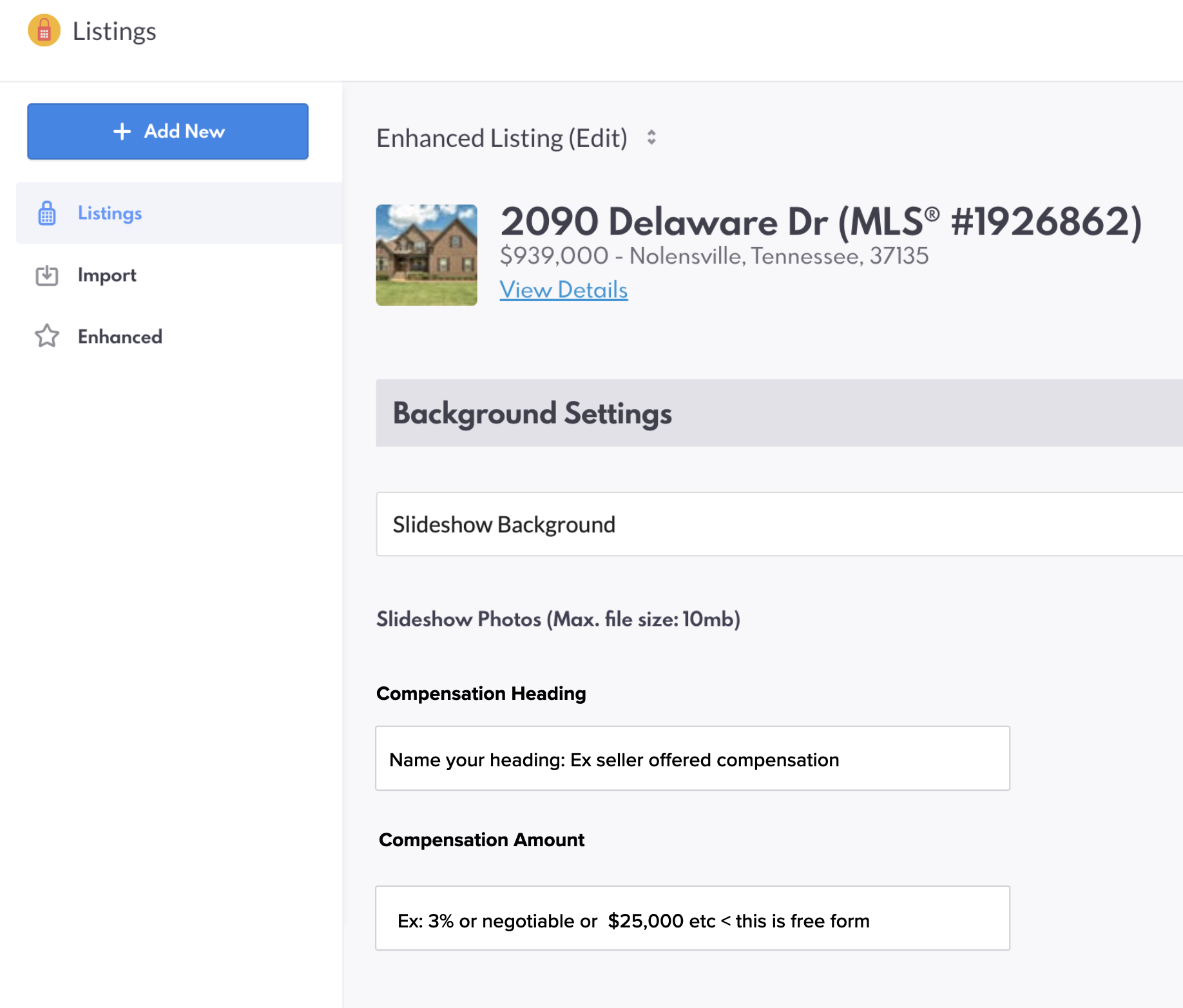If there is one word that summarizes the hoped-for outcome of all the buyer commission lawsuits that have roiled the residential real estate industry over the recent past year, it has to be transparency.
After the now-famous Burnett court decision and subsequent multi-million-dollar settlements from major brokerages and the National Association of REALTORS®, how and how much buyer agents will be compensated has changed. Whether it’s for the better will be determined in the future, but for Real Estate Webmasters (REW) CEO Morgan Carey, being proactive in the present is crucial.
As such, REW has created a new feature for real estate websites that allows agents and brokers to display their compensation for their own listings. It was developed in response to changes in the buyer agent landscape and the inability to showcase buyer commission in the MLS.

The feature is currently being beta tested by some brokerages and will be available to all customers on REW’s Renaissance platform after the testing period. Carey believes the feature will revolutionize real estate websites by providing transparency around listing compensation, attracting more buyers and facilitating conversations about fees.
“In the backend, we have a new tool that allows our customers (team leaders/brokerages) to select their specific listings by offers, team leader or agent, and they can then set (by dollar or %) an estimated buyer agent compensation,” he says. “This will be huge as it solves the problem of buyers’ agents having to call on every single listing and ask/negotiate a buyer’s commission as a portion of seller agent commission.
“For consumers, they can offer with confidence on a listing knowing they won’t have to find an alternative source of funds above and beyond the proceeds of the sale to pay a buyer commission separately.”
Carey said the genesis of the new feature was partially from a phone call he had recently.
“I was on a call with Gary Ashton (CEO/owner of The Ashton Real Estate Group of RE/MAX Advantage in Nashville, Tennessee), and he was like, ‘I don’t know how we’re going to be able to showcase the buyer commission now that they’re not in the MLS,’” he says. “And I basically said, ‘I can do that for you.’ It’s not difficult. We already have his listings. We already have a feature that allows them to enhance their listings, add other photos, and do other stuff. So really, I thought to make an extension of that would be pretty easy and add another field that allows them for their own listings only to display the compensation.”
Next came a few rounds of tinkering and talking through it, as different listings can have different compensation structures.
“We went through a couple of iterations,” notes Carey. “The first was like, you can change the comp on a per-listing basis, but what if it’s a different kind of compensation? So we needed to change the labels as well. Now we’re at a point where it’s completely customizable so they can stay in compliance as well as customize the language that they use for the compensation itself. All of that is unique and different because there isn’t a vendor out there who offers this.
It will be available to all customers on REW’s Renaissance platform. After the beta testing period, which will be over in about 30 days, all customers on Renaissance will automatically get it.”
Current REW clients are aware of the new development, or can become aware via a discussion group with screenshots at rew.com/forums.
Carey explained the significance of the new feature, especially in light of industry changes from results of the commission lawsuits.
“The ability to understand and communicate compensation offers to their buyers is no longer available in a sort of shared setting, and so what we are doing is making that available,” he says. “For companies who are going to use this, the huge advantage is they will become known as the transparent brokerage from a compensation perspective. We don’t know how often this is going to come up with consumers, sellers and buyers, but we absolutely know it’s an issue for agents. Buyer agents publicizing in a transparent way their compensation upfront will be perceived as transparent, and it’ll create an advantage for them because people will share their sites.
“It’s just common sense that buyers are going to gravitate toward a listing that does not require them to pay extra money out of pocket. Buyers are going to gravitate toward listings that offer compensation, and so brokerages that have transparency around listing compensation are going to attract more buyers.”
There are benefits for listing agents as well.
“The feature allows the selling agent to defend their fees when they’re having a conversation from a listing perspective,” says Carey. “Like, ‘We are 6% (or whatever their fees are), but we are actually offering buyer compensation out of our end in order to attract the most buyers possible to sell your listing for a higher price.’ So it’s a value-added conversation for both sides.”
Despite the risk of other developers copying the idea, Carey welcomes it as a testament to the quality of his work.
“People steal my ideas all the time,” he says. “That’s what makes us REW. Every good website out there looks like an REW website from two years ago.”
For more information, visit https://www.realestatewebmasters.com/.













All providers are doing this. Delta Media Group has had this as an option on property display for months being powered by MLS data and has pivoted to allowing sales associates to simply enter the information now that it will not longer be provided in MLS feeds.
The way I understand any service that is getting a feed from the MLS cannot disclose compensation… Isn;t that how REW creates these property sites?
kvCore already has this feature. This is not something new.
Although I agree this would be a good thing and I believe buyers are going to gravitate towards listings that won’t cause them even more money out of pocket (which is why I don’t think we’ll see a significant difference in commissions, sellers will be putting themselves at a disadvantage by not allowing the listing broker to cooperate with buyers agents), I disagree that this is a viable solution.
I’m not an attorney and not giving legal advice, but it has been ingrained in brokers and agents for decades (as long as I’ve been in the business) that we can NEVER discuss commission(s) in the presence of another agent or broker (outside of our own firm) to protect against the mere perception of collusion even if there wasn’t any. So putting it out publicly, in my opinion is no different. The legal argument to be made is if I post the commission split on my own listings other everyone can view it were colluding with each other. The courts have made it clear, it doesn’t matter if there is actual collusion. Perception is enough.
The reality is this settlement is going to cause major issues in our industry down the road. It’s not about the commission splits, it’s not about the buyers or sellers, it’s the fact there was NO COLLUSION and we didn’t defend ourselves against it. I understand NAR was stuck between a rock and a hard place and they took the least painful option. But by doing so we’ve opened the door for tech companies to remove the need for MLS altogether.
Think about how many agents pay the company (may or may not rhyme with pillow) that has come out and said they want to change the way real estate is done and wants remove brokers and agents from the equation altogether. But agents continue to pay that company for leads. Does anyone really think when a tech company creates (or modifies their existing) platform to handle syndication nation wide for lets say $9.95/month agents won’t forgo paying $100’s or even $1,000’s/month to their MLS(s) since we can no longer cooperate with other brokers there? MLS exists SOLELY for the purpose of cooperation. Remove that from the equation and they’ve become not much more than a marketing platform to distribute data. That can be done much cheaper than it is today.
Once they remove MLS’s they control the data, once they control the data… well you tell me what comes next. Do I think we’ll be put out of business? No, but that doesn’t mean we’ll like what the industry becomes. If 90% of what we do goes away and what’s left is the “Hand Holding” the trusted advisor role (and nothing else), we become nothing more than customer service representative. Our value is the service as a whole, not just the advising. If that’s all that remains our industry will change dramatically and not for the better.